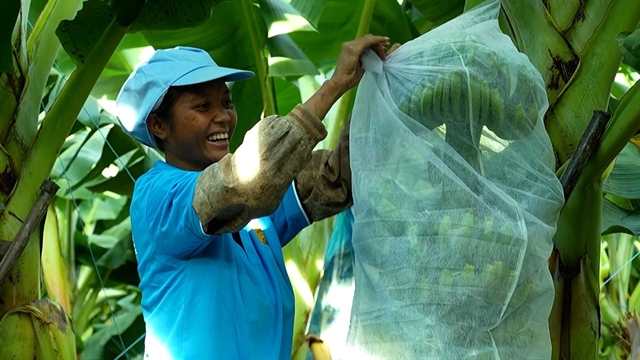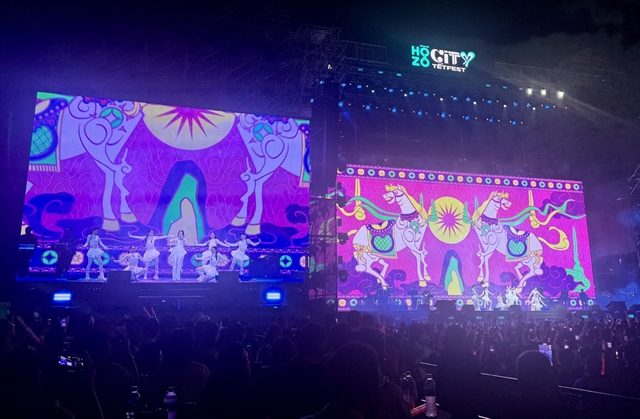 Features
Features
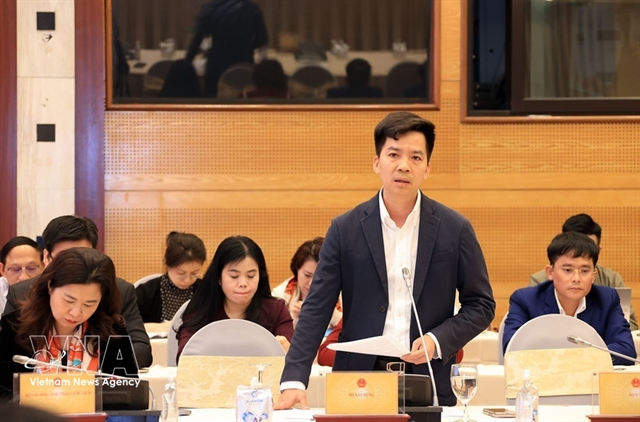
A group of bio-researchers at Đà Nẵng's Teacher Training College under Đà Nẵng University have been raising 40 species of algae to support four key industries – aquaculture, pharmaceutical production, environmental protection and bio-fuel – for decades.

|
| Dr Trịnh Đăng Mậu checks algae growing in a lab at Đà Nẵng's Teachers College. It's the first biological laboratory and gene research and development centre in central Việt Nam. VNS Photo Công Thành |
By Công Thành
A group of bio-researchers at Đà Nẵng's Teachers College under Đà Nẵng University have been raising 40 species of algae to support four key industries – aquaculture, pharmaceutical production, environmental protection and bio-fuel – for decades.
It’s the first bio-lab in central Việt Nam to develop algae that can be widely applied in mass production and value chains for scientific research, production and market sales.
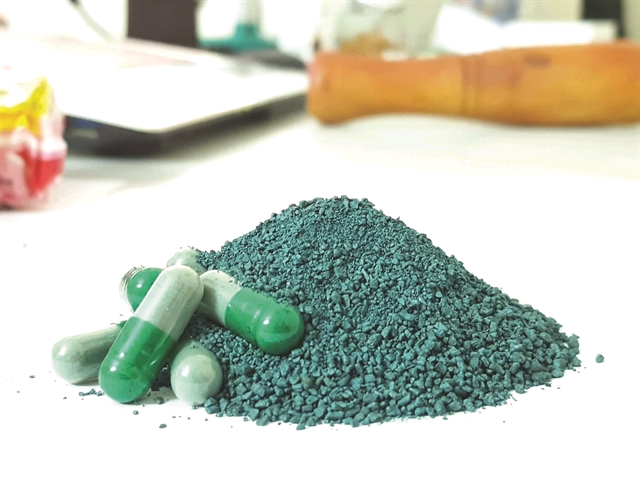
|
| Capsules of spirogyra (spirulina platensis) - a kind of algae - are used to make a healthy tea. This is the result of decades of research. Photo courtesy of Trịnh Đăng Mậu |
Three key algae species – spirogyra (spirulina platensis), green algae (chlorella vulgaris) and red algae (haematococus pluviallis) – can be used for pollution treatment and bio-fuel, functional food and nutritional food for aquatic farms.
Dr Trịnh Đăng Mậu, 34, a biologist and the mastermind behind the algae research laboratory, said central Việt Nam has great potential to promote environmentally friendly algae aquaculture for mass use in different fields.
It’s also a sustainable option for prolonged wastewater treatment and polluted lakes in cities, while algae can supply rich nutritious feed for shrimp and fish farms and increase natural antibiotics among species, he said.
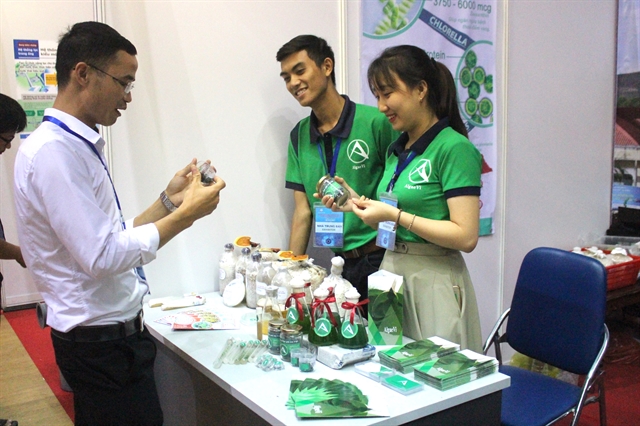
|
| An exhibition stand displays products made from various algae species at Đà Nẵng's Teachers College. Central Việt Nam has favourable conditions for growing algae for wide uses on farms, pollution treatment, bio-fuel and pharmaceutical production. Photo courtesy of Trịnh Đăng Mậu |
“We have found that algae can clean 90 per cent of the waste released from a shrimp farm within two days. Heavy metals from the textile and dyeing industries can be absorbed by the algae,” Mậu said.
He said every three grammes of green algae can help process a cubic metre of polluted water in one or two days. At least 80 per cent of polluting agents are purified by the green algae as it restores the quality of water.
“Polluting agents in wastewater and lakes supply nutrition for the green algae to grow. Bio-algae from wastewater could be used for bio-fuel or compost,” he explained.
He added that algae do not disturb the ecological system in lakes, while chemical component treatment can kill useful bacteria.
Algae had also been processed as an ingredient to make cakes, ice cream, functional food, tea and healthy drinks.
Gene source
The college has launched its first tissue and gene growing research centre to supply sources of algae for wider development in the central and Central Highlands regions.
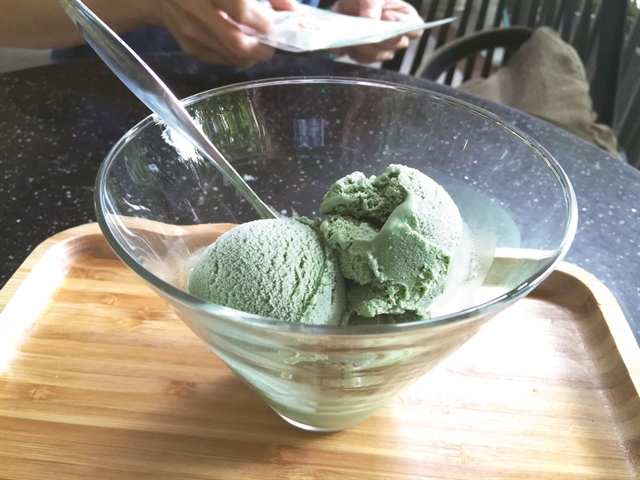
|
| Ice cream made from algae. Some algae species are being grown for baking, cosmetics and aquaculture. Photo courtesy of Trịnh Đăng Mậu |
Deputy Rector of the college Võ Văn Minh said the centre would speed up research opportunities for students while creating a foundation for a value chain for sustainable growth among scientists, farmers, businesses and policymakers.
“Effective co-operation between scientific research and agricultural production has yet to transpire in the agriculture-intensive and coastal-based economy in central Việt Nam. This is because trust needs to be built among scientists and farmers, and even policymakers,” Minh said.
“We're trying to set up a link between science and farm production to exchange knowledge and trial these ideas to create profitable joint ventures,” he added.
Minh explained farmers and businesses have skills, but they need scientific research in promoting production and reducing costs.
“It’s a future trend. Each partner can bring their own skills to the table to boost mass production. Farmers need scientific research support for high-value and low-cost production, while scientists want their research to be worth something. That’s why ties between scientists, businesses and farmers should be enhanced,” he said.
“Joint ventures will also need support from policymakers to reach profitable production.”
Lê Hữu Tình, who owns a shrimp farm in the ‘aquaculture kingdom’ of Phú Yên Province, said the algae species were being used as an effective nutritional source for shrimp larvae.
“It (algae) is as rich in nutrition as a mother’s milk. Shrimp larvae eat algae to build up their natural resistance against diseases and infection. The natural nutrients in algae will help shrimp farms limit the use of chemical-based antibiotics,” Tình said.
“Our farm also uses red algae in the shrimp feed to make them grow faster and give them their attractive pink colour. This is sustainable production from a biological technology-based solution,” he said.
Tình said his Đắc Lộc seafood company had been using algae as natural stimulant for decades.
Natural antibiotic
Minh said locally grown algae helped aquaculture farms reduce production costs by spending less on antibiotics and disease prevention measures.
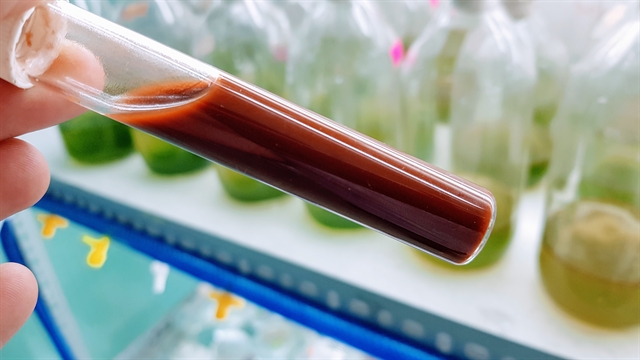
|
| Red algae (haematococus pluviallis) is grown in a tube at the laboratory in Đà Nẵng. The algae species can be used as food at aquaculture farms. Photo courtesy of Trịnh Đăng Mậu |
“It’s a cost-saving option for farm owners so they can just focus on breeding shrimp, while algae and bio-based solutions can be provided by research labs,” he said.
“The exchange among farmers and scientists will promote research in new species that can be helpful for farm production.”
Spirogyra has been chosen by the Vạn Tường co-operative as a key product for developing community-based tourism in Bình Sơn District, Quảng Ngãi Province.
Nguyễn Văn Thịnh, head of the co-operative, said the wetland area in Bình Sơn would be a good habitat for different algae species.
“Algae products range from functional food, materials for cosmetic production, an environmental cleanser and pharmaceutical production, so they will play a key role in the One-Commune-One Product (OCOP) initiative by promoting eco-tourism,” Thịnh said.
“These natural products will help local farmers diversify from rice farming, coastal fishing, aquaculture and crafts. Locally grown products will build a unique brand for sustainable development,” he said.
Thịnh added that farmers would live well from profitable farm produce and the recycling economy on the basis of scientific research.
Lecturers and students at the college have been involved in producing bio-fuels from green algae, functional food and wastewater treatment agents, as well as feed aquaculture farms and materials for pharmaceutical production.
“We have been looking to work with businesses and farmers. Our profitable research needs funding from businesses and practical application from farmers. It’s a trust-building exercise for sustainable development in the future,” Minh said. VNS




